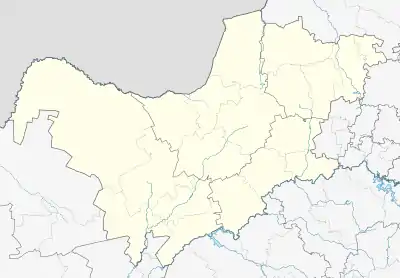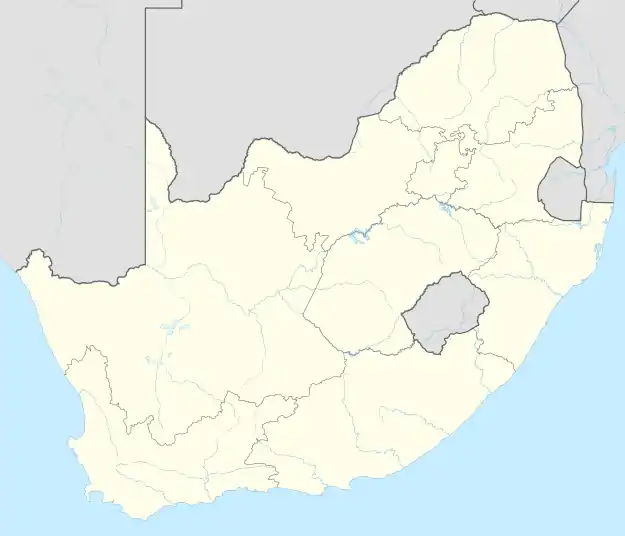Marikana
Marikana, formerly known as Rooikoppies, 'Marikana' is botched version of the name of a river in the land of Bapo called 'Maretlwane'. It a platinum mining town, the home of the then Lonmin, now Sibanye, in the Rustenburg local municipality, Bojanala Platinum District Municipality district in the North West province of South Africa.
Marikana (Maretlwane)
Rooikoppies or Koppies | |
|---|---|
 Marikana (Maretlwane)  Marikana (Maretlwane) | |
| Coordinates: 25.698°S 27.472°E | |
| Country | South Africa |
| Province | North West |
| District | Bojanala Platinum |
| Municipality | Rustenburg |
| Area | |
| • Total | 17.54 km2 (6.77 sq mi) |
| Population (2011)[1] | |
| • Total | 19,522 |
| • Density | 1,100/km2 (2,900/sq mi) |
| Racial makeup (2011) | |
| • Black African | 98.3% |
| • Coloured | 0.1% |
| • Indian/Asian | 0.5% |
| • White | 0.9% |
| • Other | 0.2% |
| First languages (2011) | |
| • Tswana | 30.0% |
| • Xhosa | 29.7% |
| • Tsonga | 18.1% |
| • Sotho | 14.4% |
| • Other | 7.9% |
| Time zone | UTC+2 (SAST) |
| Postal code (street) | 0284 |
| PO box | 0284 |
| Area code | 014 |
The name Rooikoppies means 'red hills' in Afrikaans.
Neighbouring localities include Marikana train station (1 km; 0.62 mi to the north-east), Wonderkop (4 km; 2.5 mi), Ramala (where residents were forcibly till today, removed by the apartheid government for mining purposes), Rietfontein, Rustenburg (29 km; 18 mi); Swaershoek (30 km; 19 mi); Mooinooi (31 km; 19 mi); Brits (36 km; 22 mi); Monnakoto (38 km; 24 mi); Hartbeespoort (43 km; 27 mi); Kosmos (48 km; 30 mi).[2]
History
The town was laid out in 1870 on the farm Rooikoppes, and the settlement later expanded into seven white-owned farms. In 1933, the Buffelspoort Dam was built, allowing the local farmers to irrigate their crops.[3]
The farming community grew in the 1960s on the back of lucrative tobacco farming, but other diversified farming practices i.e. cattle, maize, chillies, paprika, soya, lusern and sunflower amongst the main groups was the main economic driver of the area. In the 1970s mining was introduced and grew to become the main industry in the region. The main mining activities are PGMs and chrome. Since the introduction of mining activities, the informal and formal population had a growth explosion.
The Marikana massacre of 10 August 2012 and the subsequent killing of 34 workers by police made headlines in the international media.[4]
References
- "Main Place Marikana (Maretlwan)". Census 2011.
- Travel distances from Marikana Archived 2013-11-14 at the Wayback Machine
- "Marikana". North West History. Retrieved 26 January 2014.
- "South Africa's ANC to discuss mine shootings row". BBC News. 27 August 2012. Retrieved 27 August 2012.
.svg.png.webp)